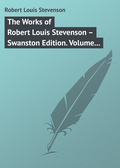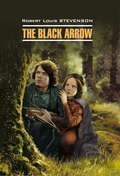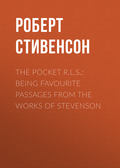
Роберт Льюис Стивенсон
The Works of Robert Louis Stevenson – Swanston Edition. Volume 23
To Sidney Colvin
I forget what were the two sets of verses (apparently satirical) here mentioned. The volume of essays must be Virginibus Puerisque, published the following spring; but it is dedicated in prose to W. E. Henley.
Ben Wyvis Hotel, Strathpeffer [July 1880].
MY DEAR COLVIN, – One or two words. We are here: all goes exceeding well with the wife and with the parents. Near here is a valley; birch woods, heather, and a stream; I have lain down and died; no country, no place, was ever for a moment so delightful to my soul. And I have been a Scotchman all my life, and denied my native land! Away with your gardens of roses, indeed! Give me the cool breath of Rogie waterfall, henceforth and for ever, world without end.
I enclose two poems of, I think, a high order. One is my dedication for my essays; it was occasioned by that delicious article in the Spectator. The other requires no explanation; c’est tout bonnement un petit chef d’œuvre de grâce, de délicatesse, et de bon sens humanitaire. Celui qui ne s’en sent pas touché jusqu’aux larmes – celui-là n’a pas vécu. I wish both poems back, as I am copyless: but they might return via Henley.
My father desires me still to withdraw the Emigrant. Whatever may be the pecuniary loss, he is willing to bear it; and the gain to my reputation will be considerable.
I am writing against time and the post runner. But you know what kind messages we both send to you. May you have as good a time as possible so far from Rogie!
R. L. S.
To Charles Baxter
A further stay at Strathpeffer led to disenchantment, not with outdoor nature but with human nature as there represented, and he relieves his feelings as follows: —
Ben Wyvis Hotel, Strathpeffer, July 1880.
MY DEAR CHERLS, – I am well but have a little over-tired myself which is disgusting. This is a heathenish place near delightful places, but inhabited, alas! by a wholly bestial crowd.
ON SOME GHOSTLY COMPANIONS AT A SPA
I had an evil day when I
To Strathpeffer drew anigh,
For there I found no human soul,
But Ogres occupied the whole.
They had at first a human air
In coats and flannel underwear.
They rose and walked upon their feet
And filled their bellies full of meat,
Then wiped their lips when they had done —
But they were ogres every one.
Each issuing from his secret bower
I marked them in the morning hour.
By limp and totter, list and droop,
I singled each one from the group.
Detected ogres, from my sight
Depart to your congenial night
From these fair vales: from this fair day
Fleet, spectres, on your downward way,
Like changing figures in a dream
To Muttonhole and Pittenweem!
Or, as by harmony divine
The devils quartered in the swine,
If any baser place exist
In God’s great registration list —
Some den with wallow and a trough —
Find it, ye ogres, and be off!
Yours, R. L. S.
To Isobel Strong
Further letters from Scotland during these months are lacking. The next was written, in answer to an inquiry from his stepdaughter at San Francisco, on the second day after his arrival at Davos.
Hotel Belvedere, Davos, November 1880.
No my che-ild – not Kamschatka this trip, only the top of the Alps, or thereby; up in a little valley in a wilderness of snowy mountains; the Rhine not far from us, quite a little highland river; eternal snow-peaks on every hand. Yes; just this once I should like to go to the Vienna gardens28 with the family and hear Tweedledee and drink something and see Germans – though God knows we have seen Germans enough this while back. Naturally some in the Customs House on the Alsatian frontier, who would have made one die from laughing in a theatre, and provoked a smile from us even in that dismal juncture. To see them, big, blond, sham-Englishmen, but with an unqualifiable air of not quite fighting the sham through, diving into old women’s bags and going into paroxysms of arithmetic in white chalk, three or four of them (in full uniform) in full cry upon a single sum, with their brows bent and a kind of arithmetical agony upon their mugs. Madam, the diversion of cock-fighting has been much commended, but it was not a circumstance to that Custom House. They only opened one of our things: a basket. But when they met from within the intelligent gaze of Woggs, they all lay down and died. Woggs is a fine dog…
God bless you! May coins fall into your coffee and the finest wines and wittles lie smilingly about your path, with a kind of dissolving view of fine scenery by way of background; and may all speak well of you – and me too for that matter – and generally all things be ordered unto you totally regardless of expense and with a view to nothing in the world but enjoyment, edification, and a portly and honoured age. – Your dear papa,
R. L. S.
To A. G. Dew-Smith
This, from the same place and about the same date, is addressed by way of thanks to a friend at Cambridge, the late Mr. A. G. Dew-Smith, who had sent him a present of a box of cigarettes. Mr. Dew-Smith, a man of fine artistic tastes and mechanical genius, with a silken, somewhat foreign, urbanity of bearing, was the original, so far as concerns manner and way of speech, of Attwater in the Ebb-Tide.
[Hotel Belvedere, Davos, November 1880].
Figure me to yourself, I pray —
A man of my peculiar cut —
Apart from dancing and deray,29
Into an Alpine valley shut;
Shut in a kind of damned Hotel,
Discountenanced by God and man;
The food? – Sir, you would do as well
To cram your belly full of bran.
The company? Alas, the day
That I should dwell with such a crew,
With devil anything to say,
Nor any one to say it to!
The place? Although they call it Platz,
I will be bold and state my view;
It’s not a place at all – and that’s
The bottom verity, my Dew.
There are, as I will not deny,
Innumerable inns; a road;
Several Alps indifferent high;
The snow’s inviolable abode;
Eleven English parsons, all
Entirely inoffensive; four
True human beings – what I call
Human – the deuce a cipher more;
A climate of surprising worth;
Innumerable dogs that bark;
Some air, some weather, and some earth;
A native race – God save the mark! —
A race that works, yet cannot work,
Yodels, but cannot yodel right,
Such as, unhelp’d, with rusty dirk,
I vow that I could wholly smite.
A river30 that from morn to night
Down all the valley plays the fool;
Not once she pauses in her flight,
Nor knows the comfort of a pool;
But still keeps up, by straight or bend,
The selfsame pace she hath begun —
Still hurry, hurry, to the end —
Good God, is that the way to run?
If I a river were, I hope
That I should better realise
The opportunities and scope
Of that romantic enterprise.
I should not ape the merely strange,
But aim besides at the divine;
And continuity and change
I still should labour to combine.
Here should I gallop down the race,
Here charge the sterling31 like a bull;
There, as a man might wipe his face,
Lie, pleased and panting, in a pool.
But what, my Dew, in idle mood,
What prate I, minding not my debt?
What do I talk of bad or good?
The best is still a cigarette.
Me whether evil fate assault,
Or smiling providences crown —
Whether on high the eternal vault
Be blue, or crash with thunder down —
I judge the best, whate’er befall,
Is still to sit on one’s behind,
And, having duly moistened all,
Smoke with an unperturbed mind.
R. L. S.
To Thomas Stevenson
R. L. S. here sketches for his father the plan of the work on Highland history which they had discussed together in the preceding summer, and which Principal Tulloch had urged him to attempt.
Hotel Belvedere, Davos [December 12, 1880].
MY DEAR FATHER, – Here is the scheme as well as I can foresee. I begin the book immediately after the ’15, as then began the attempt to suppress the Highlands.
I. Thirty Years’ Interval
(1) Rob Roy.
(2) The Independent Companies: the Watches.
(3) Story of Lady Grange.
(4) The Military Roads, and Disarmament: Wadeand
(5) Burt.
II. The Heroic Age
(1) Duncan Forbes of Culloden.
(2) Flora Macdonald.
(3) The Forfeited Estates; including Hereditary Jurisdictions; and the admirable conduct of the tenants.
III. Literature here intervenes
(1) The Ossianic Controversy.
(2) Boswell and Johnson.
(3) Mrs. Grant of Laggan.
IV. Economy
(1) Highland Economics.
(2) The Reinstatement of the Proprietors.
(3) The Evictions.
(4) Emigration.
(5) Present State.
V. Religion
(1) The Catholics, Episcopals, and Kirk, and Soc. Prop. Christ. Knowledge.
(2) The Men.
(3) The Disruption.
All this, of course, will greatly change in form, scope, and order; this is just a bird’s-eye glance. Thank you for Burt, which came, and for your Union notes. I have read one-half (about 900 pages) of Wodrow’s Correspondence, with some improvement, but great fatigue. The doctor thinks well of my recovery, which puts me in good hope for the future. I should certainly be able to make a fine history of this.
My Essays are going through the press, and should be out in January or February. – Ever affectionate son,
R. L. S.
To Sidney Colvin
[Hotel Belvedere, Davos, December 1880]
MY DEAR COLVIN, – I feel better, but variable. I see from the doctor’s report that I have more actual disease than I supposed; but there seems little doubt of my recovery. I like the place and shall like it much better when you come at Christmas. That is written on my heart: S. C. comes at Christmas: so if you play me false, I shall have a lie upon my conscience. I like Symonds very well, though he is much, I think, of an invalid in mind and character. But his mind is interesting, with many beautiful corners, and his consumptive smile very winning to see. We have had some good talks; one went over Zola, Balzac, Flaubert, Whitman, Christ, Handel, Milton, Sir Thomas Browne; do you see the liaison? – in another, I, the Bohnist, the un-Grecian, was the means of his conversion in the matter of the Ajax. It is truly not for nothing that I have read my Buckley.32
To-day the south wind blows; and I am seedy in consequence.
Later.– I want to know when you are coming, so as to get you a room. You will toboggan and skate your head off, and I will talk it off, and briefly if you don’t come pretty soon, I will cut you off with a shilling.
It would be handsome of you to write. The doctor says I may be as well as ever; but in the meantime I go slow and am fit for little. – Ever yours,
R. L. S.
To Edmund Gosse
The suggestions contained in the following two letters to Mr. Gosse refer to the collection of English Odes which that gentleman was then engaged in editing (Kegan Paul, 1881).
Hotel Belvedere, Davos, [Dec. 6, 1880].
MY DEAR WEG, – I have many letters that I ought to write in preference to this; but a duty to letters and to you prevails over any private consideration. You are going to collect odes; I could not wish a better man to do so; but I tremble lest you should commit two sins of omission. You will not, I am sure, be so far left to yourself as to give us no more of Dryden than the hackneyed St. Cecilia; I know you will give us some others of those surprising masterpieces where there is more sustained eloquence and harmony of English numbers than in all that has been written since; there is a machine about a poetical young lady,33 and another about either Charles or James, I know not which; and they are both indescribably fine. (Is Marvell’s Horatian Ode good enough? I half think so.) But my great point is a fear that you are one of those who are unjust to our old Tennyson’s Duke of Wellington. I have just been talking it over with Symonds; and we agreed that whether for its metrical effects, for its brief, plain, stirring words of portraiture, as – he “that never lost an English gun,” or – the soldier salute; or for the heroic apostrophe to Nelson; that ode has never been surpassed in any tongue or time. Grant me the Duke, O Weg! I suppose you must not put in yours about the warship; you will have to admit worse ones, however. – Ever yours,
R. L. S.
To Edmund Gosse
Hotel Belvedere, Davos, Dec. 19, 1880.
This letter is a report of a long sederunt, also steterunt, in small committee at Davos Platz, Dec. 15, 1880. Its results are unhesitatingly shot at your head.
MY DEAR WEG, – We both insist on the Duke of Wellington. Really it cannot be left out. Symonds said you would cover yourself with shame, and I add, your friends with confusion, if you leave it out. Really, you know it is the only thing you have, since Dryden, where that irregular odic, odal, odous (?) verse is used with mastery and sense. And it’s one of our few English blood-boilers.
(2) Byron: if anything: Prometheus.
(3) Shelley (1) The World’s Great Age from Hellas; we are both dead on. After that you have, of course, The West Wind thing. But we think (1) would maybe be enough; no more than two any way.
(4) Herrick. Meddowes and Come, my Corinna. After that Mr. Wickes: two any way.
(5) Leave out stanza 3rd of Congreve’s thing, like a dear; we can’t stand the “sigh” nor the “peruke.”
(6) Milton. Time and the Solemn Music. We both agree we would rather go without L’Allegro and Il Penseroso than these; for the reason that these are not so well known to the brutish herd.
(7) Is the Royal George an ode, or only an elegy? It’s so good.
(8) We leave Campbell to you.
(9) If you take anything from Clough, but we don’t either of us fancy you will, let it be Come back.
(10) Quite right about Dryden. I had a hankering after Threnodia Augustalis; but I find it long and with very prosaic holes: though, O! what fine stuff between whiles.
(11) Right with Collins.
(12) Right about Pope’s Ode. But what can you give? The Dying Christian? or one of his inimitable courtesies? These last are fairly odes, by the Horatian model, just as my dear Meddowes is an ode in the name and for the sake of Bandusia.
(13) Whatever you do, you’ll give us the Greek Vase.
(14) Do you like Jonson’s “loathed stage“? Verses 2, 3, and 4 are so bad, also the last line. But there is a fine movement and feeling in the rest.
We will have the Duke of Wellington by God. Pro Symonds and Stevenson.
R. L. S.
To Charles Warren Stoddard
The prospect here alluded to of a cheap edition of the little travel-books did not get realised. The volume of essays in the printer’s hands was Virginibus Puerisque. I do not know what were the pages in broad Scots copied by way of enclosure.
Hotel Belvedere, Davos, [December 1880].
DEAR CHARLES WARREN STODDARD, – Many thanks to you for the letter and the photograph. Will you think it mean if I ask you to wait till there appears a promised cheap edition? Possibly the canny Scot does feel pleasure in the superior cheapness; but the true reason is this, that I think to put a few words, by way of notes, to each book in its new form, because that will be the Standard Edition, without which no g.’s l.34 will be complete. The edition, briefly, sine qua non. Before that, I shall hope to send you my essays, which are in the printer’s hands. I look to get yours soon. I am sorry to hear that the Custom House has proved fallible, like all other human houses and customs. Life consists of that sort of business, and I fear that there is a class of man, of which you offer no inapt type, doomed to a kind of mild, general disappointment through life. I do not believe that a man is the more unhappy for that. Disappointment, except with one’s self, is not a very capital affair; and the sham beatitude, “Blessed is he that expecteth little,” one of the truest, and in a sense, the most Christlike things in literature.
Alongside of you, I have been all my days a red cannon ball of dissipated effort; here I am by the heels in this Alpine valley, with just so much of a prospect of future restoration as shall make my present caged estate easily tolerable to me – shall or should, I would not swear to the word before the trial’s done. I miss all my objects in the meantime; and, thank God, I have enough of my old, and maybe somewhat base philosophy, to keep me on a good understanding with myself and Providence.
The mere extent of a man’s travels has in it something consolatory. That he should have left friends and enemies in many different and distant quarters gives a sort of earthly dignity to his existence. And I think the better of myself for the belief that I have left some in California interested in me and my successes. Let me assure you, you who have made friends already among such various and distant races, that there is a certain phthisical Scot who will always be pleased to hear good news of you, and would be better pleased by nothing than to learn that you had thrown off your present incubus, largely consisting of letters I believe, and had sailed into some square work by way of change.
And by way of change in itself, let me copy on the other pages some broad Scotch I wrote for you when I was ill last spring in Oakland. It is no muckle worth: but ye should na look a gien horse in the moo’. – Yours ever,
R. L. Stevenson.
To Mr. And Mrs. Thomas Stevenson
The verses here mentioned to Dr. John Brown (the admired author of Rab and his Friends) were meant as a reply to a letter of congratulation on the Inland Voyage received from him the year before. They are printed in Underwoods.
Hotel Belvedere, Davos, December 21, 1880.
MY DEAR PEOPLE, – I do not understand these reproaches. The letters come between seven and nine in the evening; and every one about the books was answered that same night, and the answer left Davos by seven o’clock next morning. Perhaps the snow delayed them; if so, ’tis a good hint to you not to be uneasy at apparent silences. There is no hurry about my father’s notes; I shall not be writing anything till I get home again, I believe. Only I want to be able to keep reading ad hoc all winter, as it seems about all I shall be fit for. About John Brown, I have been breaking my heart to finish a Scotch poem to him. Some of it is not really bad, but the rest will not come, and I mean to get it right before I do anything else.
The bazaar is over, £160 gained, and everybody’s health lost: altogether, I never had a more uncomfortable time; apply to Fanny for further details of the discomfort.
We have our Wogg in somewhat better trim now, and vastly better spirits. The weather has been bad – for Davos, but indeed it is a wonderful climate. It never feels cold; yesterday, with a little, chill, small, northerly draught, for the first time, it was pinching. Usually, it may freeze, or snow, or do what it pleases, you feel it not, or hardly any.
Thanks for your notes; that fishery question will come in, as you notice, in the Highland Book, as well as under the Union; it is very important. I hear no word of Hugh Miller’s Evictions; I count on that. What you say about the old and new Statistical is odd. It seems to me very much as if I were gingerly embarking on a History of Modern Scotland. Probably Tulloch will never carry it out. And, you see, once I have studied and written these two vols., The Transformation of the Scottish Highlands and Scotland and the Union, I shall have a good ground to go upon. The effect on my mind of what I have read has been to awaken a livelier sympathy for the Irish; although they never had the remarkable virtues, I fear they have suffered many of the injustices, of the Scottish Highlanders. Ruedi has seen me this morning; he says the disease is at a standstill, and I am to profit by it to take more exercise. Altogether, he seemed quite hopeful and pleased. – I am your ever affectionate son,
R. L. S.
To Sidney Colvin
Hotel Belvedere, Davos, [Christmas 1880].
MY DEAR COLVIN, – Thanks for yours; I waited, as I said I would. I now expect no answer from you, regarding you as a mere dumb cock-shy, or a target, at which we fire our arrows diligently all day long, with no anticipation it will bring them back to us. We are both sadly mortified you are not coming, but health comes first; alas, that man should be so crazy. What fun we could have, if we were all well, what work we could do, what a happy place we could make it for each other! If I were able to do what I want; but then I am not, and may leave that vein.
No. I do not think I shall require to know the Gaelic; few things are written in that language, or ever were; if you come to that, the number of those who could write, or even read it, through almost all my period, must, by all accounts, have been incredibly small. Of course, until the book is done, I must live as much as possible in the Highlands, and that suits my book as to health. It is a most interesting and sad story, and from the ’45 it is all to be written for the first time. This, of course, will cause me a far greater difficulty about authorities; but I have already learned much, and where to look for more. One pleasant feature is the vast number of delightful writers I shall have to deal with: Burt, Johnson, Boswell, Mrs. Grant of Laggan, Scott. There will be interesting sections on the Ossianic controversy and the growth of the taste for Highland scenery. I have to touch upon Rob Roy, Flora Macdonald, the strange story of Lady Grange, the beautiful story of the tenants on the Forfeited Estates, and the odd, inhuman problem of the great evictions. The religious conditions are wild, unknown, very surprising. And three out of my five parts remain hitherto entirely unwritten. Smack! – Yours ever,
R. L. S.







